Chinese Cloud Storage & Cloud Computing Companies 2024
Adhering to data localization laws and data regulation in China is much easier if you use a Chinese cloud storage. Chinese data localization laws require sensitive personal information and important data to be stored in China, and the government must authorize any transfers outside China. This means that most of the best cloud storage services don’t work in China.
When it comes to personal cloud storage, Chinese cloud solutions priced in Chinese yuan are usually cheaper than the corresponding services in the West. Also, if you live in or around China, you will get better performance when you rent storage space with Chinese companies; the proximity to data centers contributes to lower latency and better performance.
In this article, we’ll dive into the world of enterprise and personal cloud technology in China, from Chinese data regulation to Chinese cloud storage and cloud computing providers. If you decide you want a cloud computing option outside of China, read our top cloud computing services list.
Chinese Cloud Storage Landscape
Chinese cloud storage solutions are mostly identical to those of their Western counterparts. However, they typically offer more free storage and are generally cheaper. They also operate under restrictive regulations and readily integrate with Chinese technology.
That said, the Chinese cloud computing landscape is currently the second largest in the world, behind the United States.2 It has continued to expand and is projected to grow by 20.75% between 2024 and 2029 while accruing over $60 billion in 2024.1
Why You Need a Chinese Cloud Solution
You need a Chinese cloud solution to satisfy Chinese data regulation requirements. A Chinese cloud solution can navigate the regulatory terrain more easily and is more likely to meet data localization laws.
Besides satisfying regulatory needs, using a Chinese cloud solution offers better local performance and comes with insights about the local market. Chinese cloud solutions also integrate easily with other local solutions and are cost-effective.
Does Dropbox Work in China?
Like most Western cloud storage solutions, Dropbox doesn’t work in China because it fails to meet Chinese regulatory standards — it doesn’t satisfy the content censorship requirements of the Chinese regulatory bodies or the Chinese data localization requirements. For more on Dropbox, check out our full Dropbox review.
Since using Dropbox in China or Google Drive in China isn’t possible, those living there will often turn to Chinese cloud storage services as alternatives.
Chinese Regulations for Data Collection & Security
To regulate data collection and security, Chinese authorities have laws such as the Personal Information Protection Law, the Data Security Law and the Cybersecurity Law.
The Chinese government requires access to data collected by critical information infrastructure operators (CIIOs), including cloud computing companies and telecommunication companies. Data localization laws mandate the local retention of data within China. These requirements influence the data collection landscape and determine how easy it is to enter the local market.
Chinese Government Data Collection
The Chinese government’s mass surveillance system collects data via many channels and is mainly used to ensure national security and economic stability. Surveillance cameras and facial recognition systems are some of the top systems. Furthermore, the government monitors and collects internet activity data, which directly involves cloud computing providers and cloud storage services.
This data collection matters because cloud computing services and other companies that hold personal data can’t ensure absolute privacy, since the government requires access to such data. For some foreign companies, this could be a barrier as it goes against their ethos. It may also discourage a privacy-conscious user from storing certain information in their cloud account.
Data Security Law & Personal Information Protection Law
The Personal Information Protection Law (PIPL) was enacted to safeguard the interests and rights of persons whose personal information may be processed by a CIIO. It also regulates personal information processing and promotes reasonable usage of this data. Some would say it’s the Chinese equivalent of the EU’s General Data Protection Regulation (GDPR).
On the other hand, the Data Security Law (DSL) regulates secure data creation, storage, classification, usage and transfer within China. It institutes policies for data categorization alongside security requirements for data in each category. It also touches on data risk management, security reviews, export controls and so on.
Besides the DSL and PIPL, the Chinese government has a Cybersecurity Law that encompasses a broad set of policies governing personal information protection, data security and network security.
Top 5 Cloud Computing Companies in China
The top five cloud computing companies in China include Alibaba Cloud, Tencent, Huawei Cloud, Baidu AI Cloud and Amazon Web Services China (AWS).
1. Alibaba Cloud — The Top Cloud Computing Provider in China
Alibaba Cloud dominates the Chinese cloud market and
is the fourth-largest provider in the world.
Alibaba Cloud is a subsidiary of Alibaba Group, owner of the popular e-commerce platform Alibaba. It ended 2023 with a 39% share in the Chinese public cloud industry, making it the top cloud service provider in China.2 Globally, Alibaba Cloud is the fourth largest by market share behind AWS, Azure and Google Cloud.3
Alibaba Cloud went live in September 2009. It currently has 89 availability zones, serving all continents except Antarctica. However, it delivers its services in Africa through BCX, which is a systems integrator company in South Africa.
You can get Software-as-a-Service (SaaS), Platform-as-a-Service (PaaS) and Infrastructure-as-a-Service (IaaS) products on Alibaba Cloud, which feature a range of security tools. However, third-party integration can sometimes be tedious when using this provider.
2. Tencent — Top Cloud Computing Company in AI

Tencent’s messaging experience drives its excellence in building communication solutions.
Tencent is currently the third-largest cloud computing company in China, following Alibaba and Huawei Cloud. At the end of 2023, it had a market share of around 15% — down 2% from the first quarter of 2023.2 While it places third in China, Tencent is among the top 10 cloud providers in the world, with a market share of around 2%.3
This cloud operation started in 2010, a year after Alibaba Cloud. Tencent is revered for its AI and communication solutions, which make it a big player in China’s telecom. This excellence in communication is unsurprising since many of its earlier products were communication solutions.
Tencent Cloud Computing offers a penetration testing service, firewalls, container security tools and other security solutions. It has services across the three delivery models — IaaS, PaaS and SaaS — with the Cloud Virtual Machine being its foremost IaaS.
3. Huawei Cloud — Cloud Backup for Mobile Devices

Huawei has been in the cloud industry since 2010,
but it officially became a cloud provider in 2016.
With a 19% market share during the last quarter of 2023, Huawei Cloud is the second-largest cloud company in China.2 While it officially started offering cloud computing services in 2016, it was in the cloud industry as early as 2011.
Huawei Cloud offers IaaS, PaaS and SaaS, and it brands itself as “Everything as a Service.” It’s available in all continents except Antarctica, but most of North America (Canada and the U.S.) can’t access it due to trade restrictions. Also, its cloud regions are mainly in East Asia, so it’s not as global as competitors like Alibaba Cloud.
Huawei Cloud has many security services, offering one of the largest collections among cloud computing companies globally. However, its security tools are primarily tailored toward data, network and application security.
4. Baidu AI Cloud — AI-Centered Cloud Service Provider
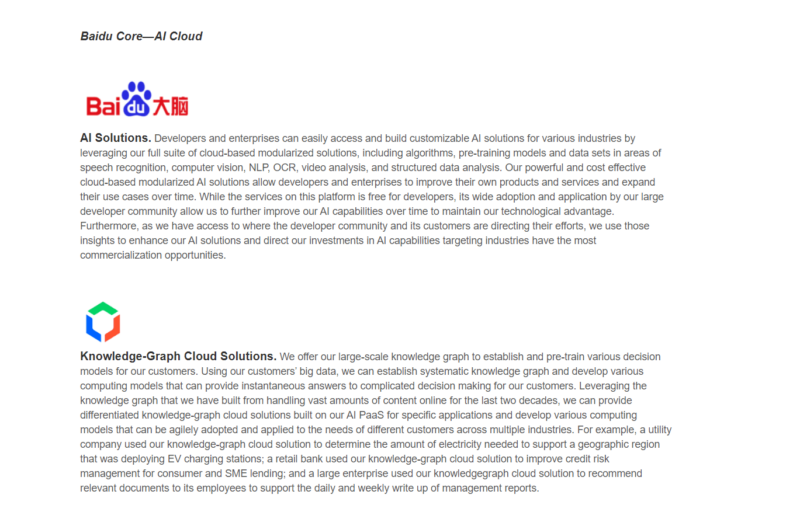
Baidu places a strong focus on artificial intelligence, which is evident in most of its services.
In 2000, Baidu emerged as a search engine. It started adopting artificial intelligence as early as 2010 before entering the cloud industry with Baidu Cloud in 2012. Baidu AI Cloud is one of the most popular cloud computing companies in China, particularly due to its personal cloud storage solution, Baidu Netdisk (also known as Baidu Wangpan).
For cloud solutions, Baidu AI Cloud offers PaaS, IaaS and SaaS. Its tight AI integration makes its services somewhat unique compared to competitors.
With secrets management, firewalls, anti-DDoS and intrusion detection services, Baidu AI Cloud has a decent range of security tools. It also provides compute, big data, storage, networking and database services.
5. AWS China — The Chinese Operations of Amazon Web Services
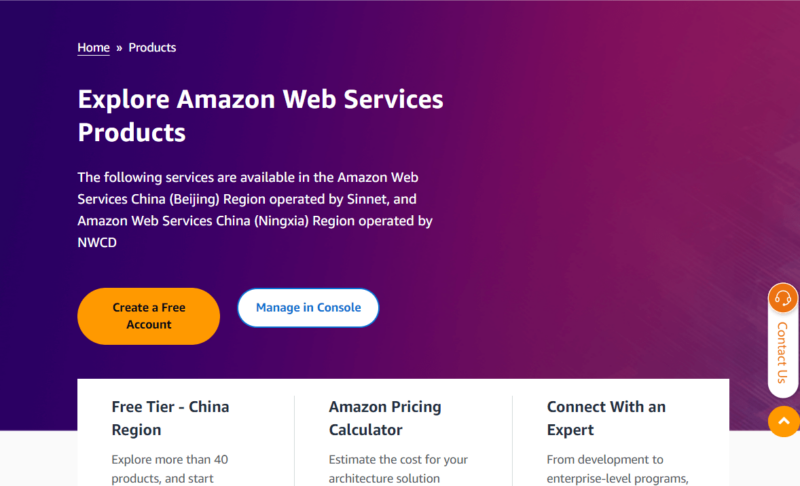
AWS operates in China through Chinese partners to comply with ICP
registration requirements and other regulatory needs.
AWS China — the Chinese operations of AWS — was established in 2013. The Beijing region launched in 2016, while the Ningxia region launched in 2017.
Note that AWS China is somewhat distinct from the regular AWS operations. To comply with Chinese regulations, AWS China delivers its cloud services through Chinese partners — Ningxia Western Cloud Data Technology (NWCD) and Beijing Sinnet Technology — instead of AWS itself. NWCD operates the Ningxia region, while Beijing Sinnet handles the Beijing region.
As expected, AWS China offers roughly the same services as AWS, from IaaS to PaaS. Many of the primary AWS security services are also available through AWS China. However, while AWS is the largest cloud provider in the world, AWS China isn’t the largest cloud solution in China.
Top 5 Chinese Cloud Storage Providers: Dropbox Alternatives
The top five Chinese cloud storage providers include Baidu Netdisk, Alibaba Cloud Drive, Huawei Mobile Cloud, NiHao Cloud and Tencent Weiyun.
1. Baidu Netdisk — Smart Cloud Storage
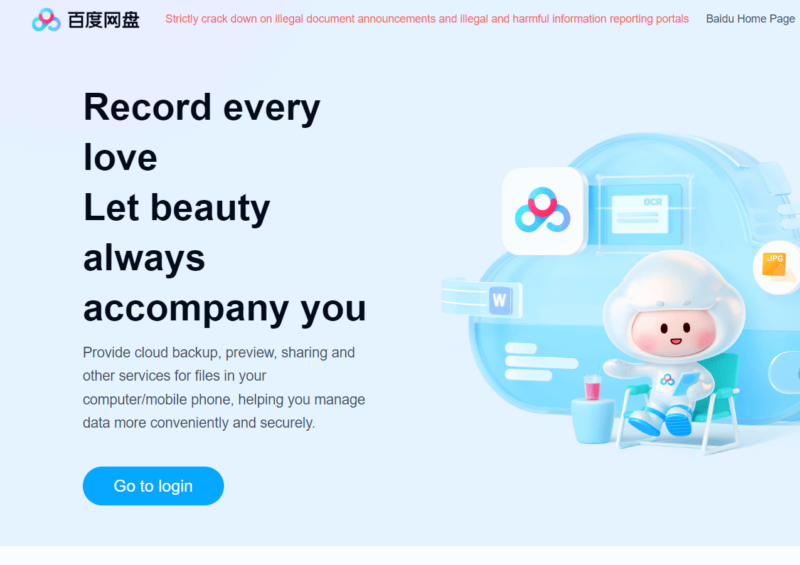
Baidu Netdisk comes with 2TB of free storage, which is
1,000 times more than what Dropbox offers.
Baidu Netdisk — also known as Baidu Wangpan — is a cloud storage service from Baidu AI Cloud. It offers up to 2TB of free cloud storage, which is far more than most cloud storage services provide, including Dropbox. It’s available on Android, Windows, macOS, Linux, iOS and smart TVs.
However, free accounts are subject to intense performance throttling on upload and download speeds, so it can be difficult to utilize all the free storage.
Baidu’s AI integration is evident in various Baidu Netdisk features. For starters, it has smart classification, smart search and auto synchronization, which make data organization and management more convenient. You can also access your content from smart hardware like your smart TV or car.
2. Alibaba Cloud Drive — Alibaba’s Photo and Drive Service
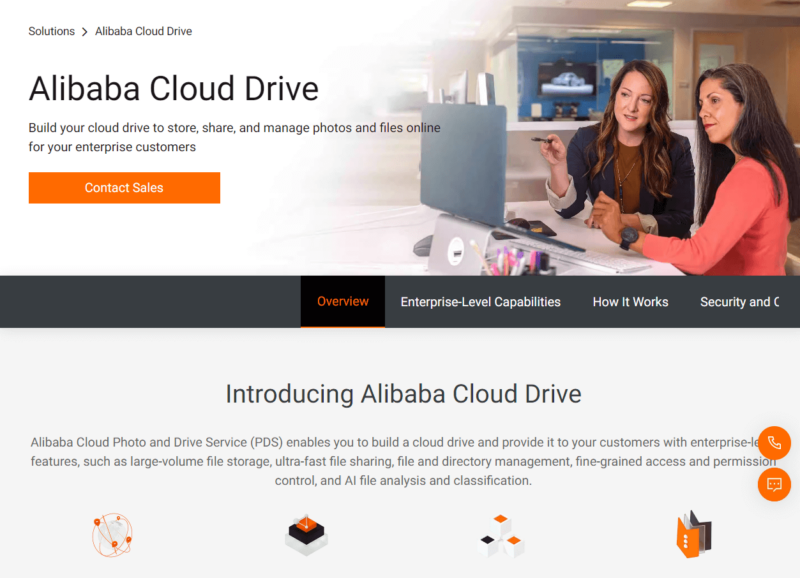
You won’t get billed twice by Alibaba Cloud Drive for duplicate files in the same drive.
Alibaba Cloud Drive — also called Alibaba Cloud Photo and Drive Service (PDS) — offers cloud storage with the usual features. These include synchronization across multiple devices, file sharing, collaboration, file management and so on. Like Baidu Wangpan, it integrates artificial intelligence into its features, particularly for file management (classification and analysis).
Beyond personal usage, Alibaba Cloud Drive is suitable for enterprises thanks to features like identity and access management, which ensure secure granular access. Additionally, it has security features like end-to-end validation and server-side encryption to protect passwords and safeguard sensitive information in general.
Alibaba PDS customers are charged based on storage space usage, data transfer volume and the number of user services. Storage space fees are billed hourly; however, you won’t be charged twice for duplicate files from different users in the same drive.
3. Huawei Mobile Cloud — Huawei’s iCloud Alternative
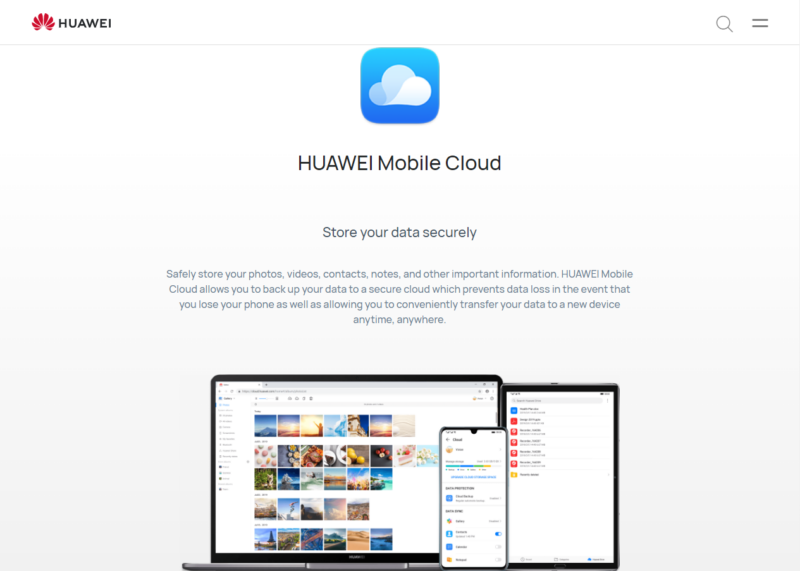
The Huawei Cloud service has more in common with iCloud than Dropbox.
Huawei Mobile Cloud offers remote storage for photos, contacts, notes and various file types. You can access it on mobile devices and computers, and it features automatic backups that can run on user-defined schedules. It also has device finding for supported Huawei devices and cross-device syncing for frequently accessed data.
Huawei Mobile Cloud provides 5GB for free, but you can get as much as 2TB for just $9.99 per month. For the most part, its pricing and features are similar to iCloud, making it more of an iCloud alternative than a Dropbox alternative.
4. NiHao Cloud — Cross-Border Cloud Storage
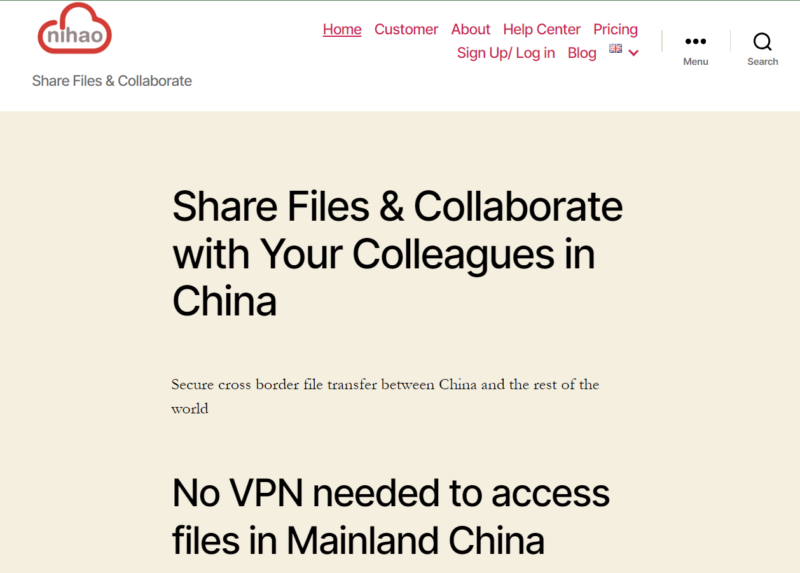
Cloud storage service NiHao Cloud offers the same amount of free storage as Dropbox.
NiHao Cloud offers a cross-border cloud storage service, so there are no restrictions for accessing files from outside mainland China. The free plan provides 2GB of storage, but you can get up to 2TB on a paid subscription.
Additionally, NiHao Cloud goes beyond personal usage. With features like access management and global sync, it’s also suitable for enterprise use and even has dedicated business plans.
5. Tencent Weiyun — Cross-Device Cloud Storage for Files
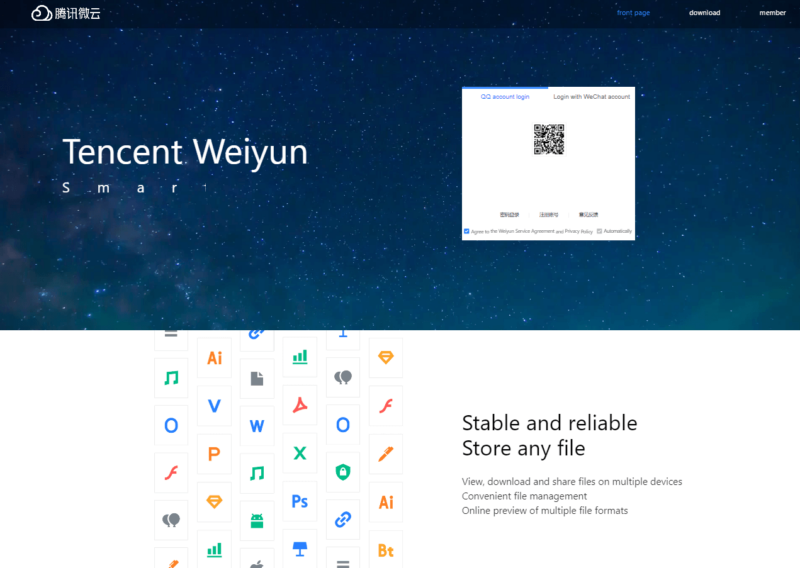
Tencent Weiyun supports most file formats, offering a preview for pretty much any file.
Cloud storage service Tencent Weiyun supports virtually all file types, and you get an online preview for nearly every file format. You can access it across various platforms and on multiple devices. Like Baidu and Alibaba, Tencent cloud storage integrates artificial intelligence into Tencent Weiyun, as demonstrated in its intelligent backup system.
The free plan with Tencent Weiyun provides 5GB of storage with a seven-day recycle bin retention period. When you pay for the membership, you get up to 6TB of storage, a 30-day retention period, online decompression and other features.
Pros and Cons of Using Chinese Cloud Storage
The cons of using Chinese cloud storage center around restrictions, integration issues and language barriers. On the other hand, the pros of using Chinese cloud storage include larger free storage, access to the local market, data localization, lower costs and so on. Here are some more details on the benefits and risks of using Chinese cloud services:
Benefits of Using Chinese Cloud Providers
- Cost-effective: Chinese cloud providers offer competitive pricing compared to their Western counterparts. For instance, Tencent Weiyun charges 30 Chinese yuan for its VIP plan (6TB) — that’s about $4 to $5 per month.
- Larger free storage: Some Chinese cloud providers like Baidu Netdisk provide large storage space as part of their free plan. This can be up to 2TB, which is high compared to Dropbox’s 2GB.
- Data localization: Using a Chinese cloud provider helps ensure that your business complies with in-country data localization regulations.
- Large market: The local Chinese cloud user market is large and can be rewarding for the businesses that break into it. Using Chinese cloud providers exposes you to the peculiarities of the market, making your entry much more seamless.
- Easy integration with local solutions: Due to their familiarity with the Chinese technology landscape, Chinese cloud services integrate better with local Chinese apps and software, especially the popular ones.
Risks of Using Chinese Cloud Services
- Censorship: Chinese laws impose content restrictions through what is known as the Great Firewall. This means there’s a limit on how you can use Chinese cloud services.
- Surveillance: The Chinese government collects internet activity data for surveillance purposes, so your data isn’t private with a Chinese cloud service.
- Integration barriers: Chinese cloud services integrate readily with local Chinese tech but not with foreign tech. This is one of the reasons why global usage is somewhat limited.
- Language barriers: Chinese cloud services typically have user interfaces and support in local languages. This could be challenging for non-Chinese users, particularly when trying to get support.
Final Thoughts
Chinese cloud computing and storage providers offer competitive pricing, larger free storage space and high AI integration. While there are concerns about restrictive regulations and data privacy, the Chinese cloud market continues to grow.
Have you ever used a Chinese cloud computing provider? Which of the cloud storage providers in this article will you be trying out soon? Let us know by leaving a comment below. Thank you for reading.
FAQ: Best Chinese Cloud Storage & Alternatives
-
The best cloud storage in China is subject to individual needs, but Alibaba Cloud Drive, Baidu Netdisk, Tencent Weiyun and Huawei Mobile Cloud are pretty popular.
-
TeraBox is not a Chinese company; it’s owned by a Japanese company called Flextech.
-
Some Chinese equivalents of Google Drive include Baidu Netdisk, Alibaba Cloud Drive, Huawei Mobile Cloud and Tencent Weiyun.
-
The main cloud service that China uses is Alibaba.
Sources:
- Public Cloud China – Statista
- China: Cloud IaaS Market Share – Statista
- Amazon Maintains Cloud Lead – Statista